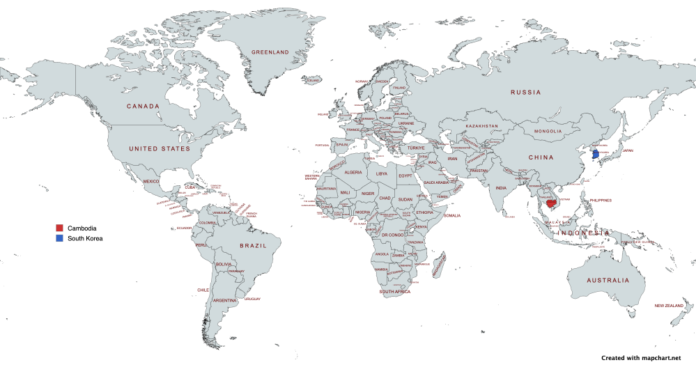
South Korea has imposed its highest level travel warning, a “code black” ban, for several regions in Cambodia after a surge in human trafficking, forced labor, and online scam operations targeting its citizens. The unprecedented move follows the death of 22-year-old university student Park Min-ho, whose body was discovered in August in Kampot province after he was allegedly tortured at a cyber scam compound.
The ban covers the border cities of Poipet and Bavet, along with the Bokor Mountain area in Kampot. Under the order, South Korean citizens are prohibited from traveling to these regions, and those currently there are instructed to leave immediately. Violators could face penalties under the country’s Passport Act.
South Korean officials estimate that around 1,000 of their citizens are trapped in Cambodia’s vast scam industry, which employs roughly 200,000 people of multiple nationalities. Victims are typically lured through fake job advertisements promising high salaries. Upon arrival, they are confined, forced to commit online financial fraud, and subjected to severe physical abuse if they resist. Survivors have described being electrocuted, beaten with metal pipes, and even threatened with organ removal.
National Security Director Wi Sung-lac said an emergency task force is working to repatriate detained citizens. “We are arranging flights home and expect to complete repatriation efforts soon,” he stated. However, he noted that returnees will undergo legal review to determine whether they willingly participated in criminal activity or were victims of coercion.
A delegation led by Vice Foreign Minister Kim Jina arrived in Phnom Penh on Wednesday to coordinate efforts with Cambodian authorities. The team includes justice, police, and intelligence officials tasked with securing the release of detained South Koreans and discussing broader cooperation on cybercrime prevention.
The South Korean government has expressed concern over the growing number of kidnappings and deaths tied to the criminal networks. In one recent case, a woman in her 30s was found dead near the Vietnam Cambodia border. Authorities are investigating whether her death is connected to the same syndicates behind Park’s killing.
Cambodian Prime Minister Hun Manet met with the South Korean delegation on Thursday, pledging to work together to “prevent and suppress online scams more effectively.” Both governments agreed to enhance collaboration through law enforcement channels and intelligence sharing.
The crisis has exposed the depth of the region’s cybercrime infrastructure. According to the United Nations Office on Drugs and Crime, Southeast Asia’s Mekong region, including parts of Cambodia, Laos, Myanmar, and Thailand, has become one of the world’s primary hubs for online fraud. Jeremy Douglas, a senior UN official, said the networks thrive because “criminals have freedom to operate and conceal profits with little resistance.”
Human rights organizations say the camps combine elements of slavery, trafficking, and financial fraud. In response, South Korea is expanding cooperation with neighboring countries and the United States to trace money flows and dismantle cross border criminal groups.
For now, Seoul’s priority remains ensuring the safe return of its citizens and preventing others from falling into a global web of deception and abuse.
South Korea = Blue
Russia = Cambodia
Image is licensed under the Creative Commons Attribution-Share Alike 4.0 International license and was created using MapChart (https://mapchart.net).